YOUNG MAVERICK: Girls Soccer
The Falcons are soaring, but they have been red carded by funding obstacles
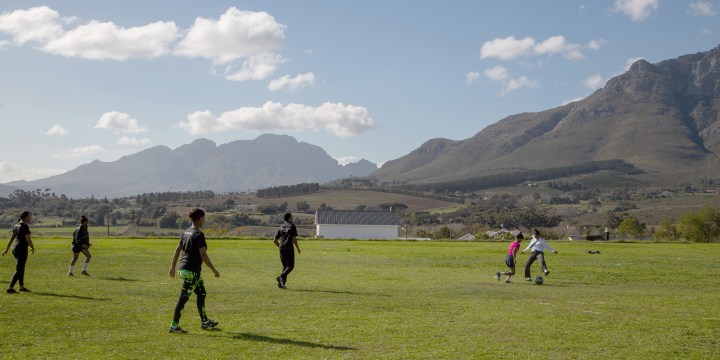
The Falcons Ladies Football Team, a Stellenbosch high school soccer team, has the chance to be the first female South African team to compete in the world’s biggest youth tournament since the 1990s. Although they earned their place in the competition, the Falcons are struggling to raise the funds to compete – a problem that persists even at the national level.
In the middle of the Cape Winelands, in southern Stellenbosch, a group of 21 teenage girls spend their Wednesday afternoons at soccer practice.
The girls gather on the field at Stellenzicht Secondary School, in Jamestown, for warm-up exercises against a backdrop of Hottentots-Holland Mountains. Some wear tracksuits, others a mix of casual clothes and school uniforms.
These girls make up the Falcons Ladies Football Team. First formed in 2016, the current team consists of girls aged from 14 to 17. Back in 2016, the team didn’t have a name and were not playing competitively.
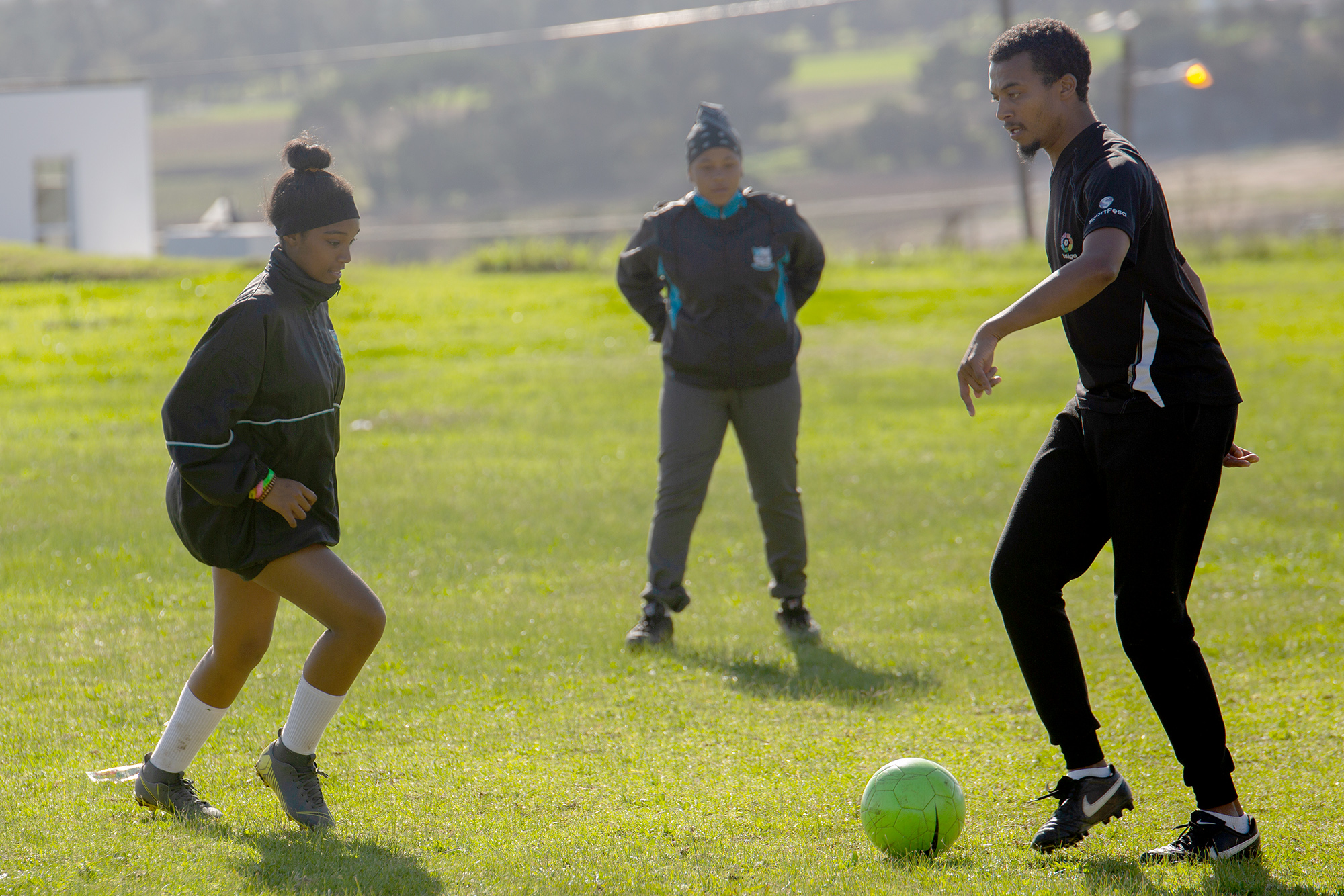
Head coach Shaun Daniels leads the Falcon Ladies Football Team at afternoon practice at Stellenzicht Secondary School, Stellenbosch, on 6 June 2019. (Photo: Aisha Abdool Karim)
“They couldn’t even kick a ball properly,” head coach Shaun Daniels told Daily Maverick.
Daniels came on board with another colleague and the two began coaching the team in 2016.
“A lot of these girls come from single-parent households, some of them are gogo kids, living with their grandmas, others are living with aunts and uncles, others live with guardians who are not family,” said Daniels.
“They have seen a lot of failure and disappointment in their lives and soccer for them is an escape from all of those things that are hampering their daily thoughts. All of those things are contained on the soccer field where we allow them to play, to be free, to be kids again.”
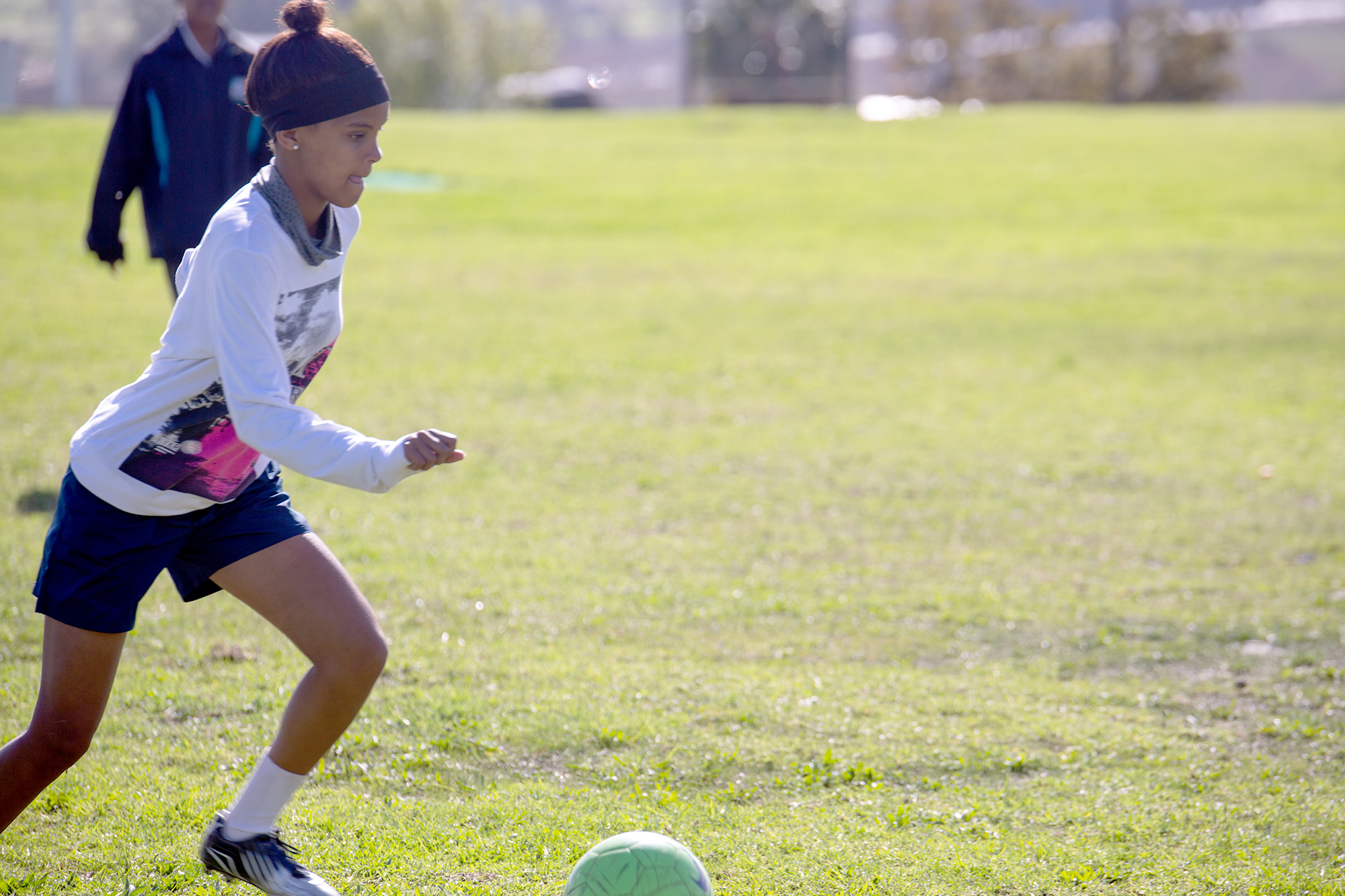
Lizel Hugo, 17, has been a member of the Falcon Ladies Football Team at Stellenzicht Secondary School, in Stellenbosch, since it started in 2016. (Photo: Aisha Abdool Karim)
When the Falcons began competing in the schools’ league they had to wait to accompany the boys’ team to other schools for matches. This did not always work in their favour, as not all local high schools had a girls’ team to play against and they sometimes had to drive to Cape Town to compete.
Unfortunately, that first year did not bring a lot of success, with Daniels describing the team as “beaten” and “hammered” in every game they played. The Falcons did not have easy access to gear and they borrowed kits from the under 15 boys’ team, sharing soccer boots.
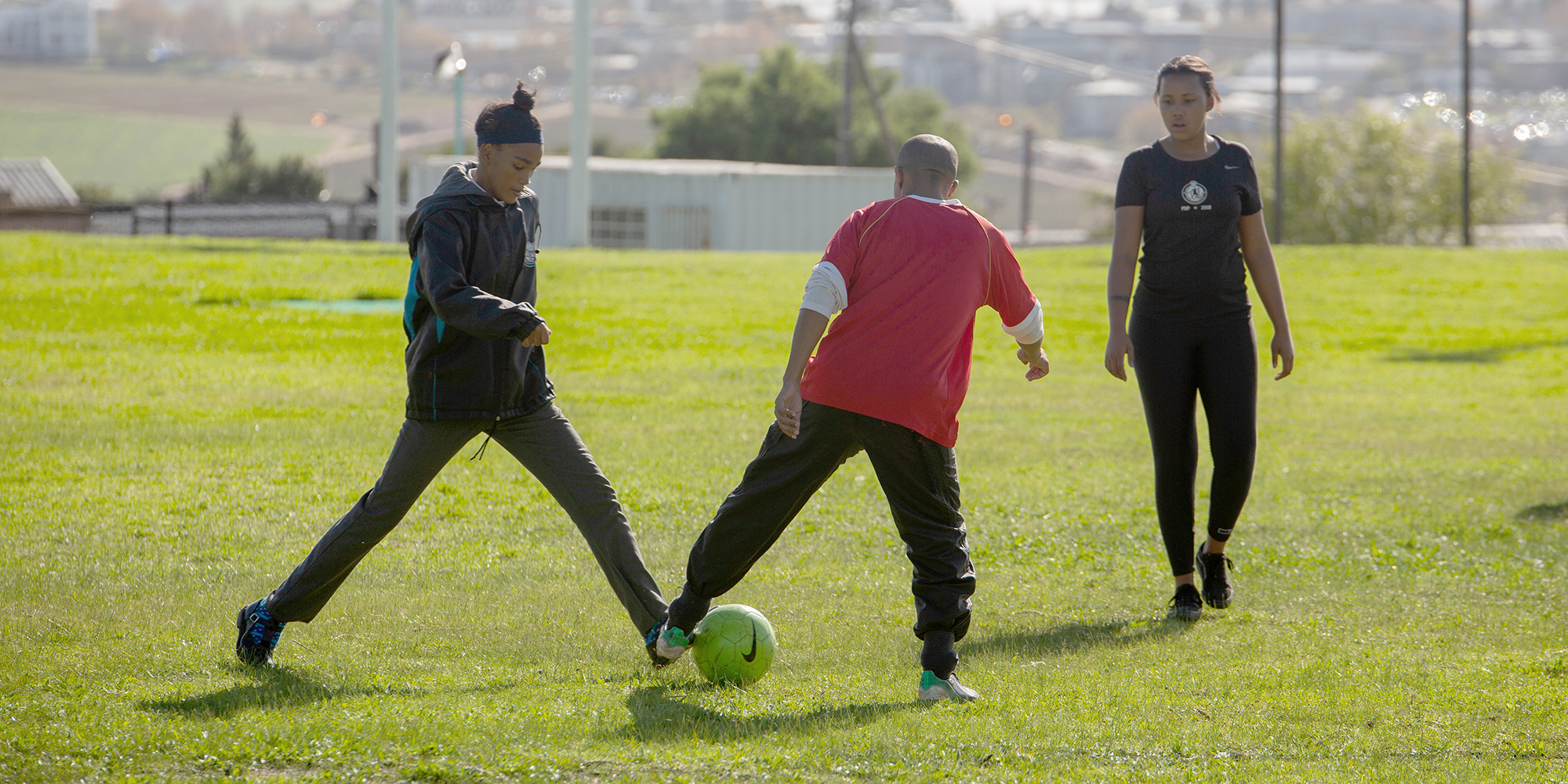
The Falcon Ladies Football Team at Stellenzicht Secondary School, in Stellenbosch, will be the first female soccer team since the 1990s to compete in the Gothia Cup, an international youth tournament. (Photo: Aisha Abdool Karim)
However, in the two years since, the team have made a complete about turn. They began by leaving the schools’ league, because of the lack of teams to compete against, and became the only high school team playing in the Cape Winelands regional league. This move also made them eligible to earn an invitation to participate in the Gothia Cup, the biggest international youth soccer tournament.
The Soweto Ladies were the first female South African team to play at this international tournament, with players including Banyana Banyana stars Portia Modise, Khabo Zitha and Fikile Sithole. The Falcons would be following in their footsteps, the first female South African team to compete in the Gothia Cup since the late 1990s. For many of the girls, who are from farming communities around Jamestown, this would be the first time they left the province.
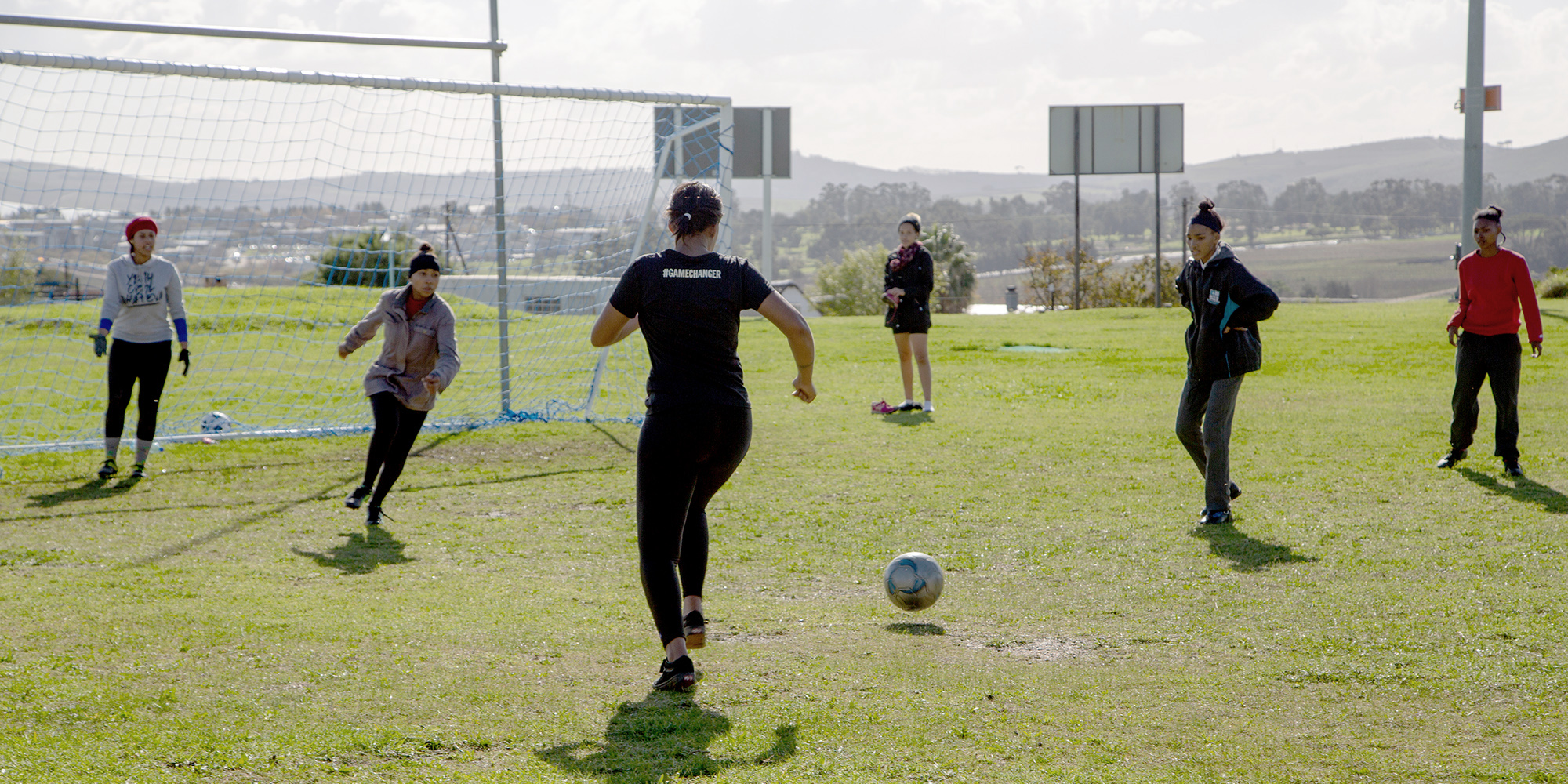
The Falcons cannot afford to go to the Gothia Cup, the biggest international youth soccer tournament, which takes place in Sweden. (Photo: Karabo Mafolo)
There is just one problem: The Falcons cannot afford to go to the tournament, which takes place in Sweden. To compete, they need an estimated R22,000 per player. Since receiving the invitation in July 2018, Daniels and the other three coaches have been struggling to raise funds for the trip.
“The part of the funding is what actually cripples,” said Daniels. “That is the red card on our team sheet at the moment.”
Although the Gothia Cup begins on 14 July, the teams need to pay their accommodation deposits and apply for visas at least one month in advance. With the deadline on Friday, 14 June, the Falcons’ prospects are not looking promising. Despite their best efforts, the team is still R164,000 short of the amount needed to send enough players to Sweden.
Daniels said the coaches had reached out to several companies about possible sponsorships as well as the Department of Sports and Recreation. These attempts have been unsuccessful; his messages normally do not even receive replies. The money raised so far has come through school fundraising efforts and community members. Some family members of the players have taken out bank loans to contribute to the trip.
“It’s difficult to keep your last bit of hope and give them that hope as well,” Daniels told Daily Maverick.
“Working behind the scenes has been tiring. It’s been tears and meetings and meetings and very late nights of trying to figure out what now?”
This issue is not one that only exists at the school league level; the lack of funding for women’s soccer goes all the way to the national level. South Africa’s national team, Banyana Banyana, have consistently outplayed their male counterparts, Bafana Bafana, and are currently playing in the Women’s World Cup. Despite Banyana Banyana’s success on the field, they have failed to generate as much revenue or receive as much recognition as the men’s team.
Modise, a former Banyana player, spoke about the underfunding of women’s soccer in an interview with CNBC Africa in December 2018. “We’re not being taken seriously so I think it starts with our nation, you know just to respect women enough to give them that platform to do what they love,” she told the news channel.
“We don’t [have] equality, we had so little money it’s not even funny. When I was playing I used to get a R400 daily allowance, R5,000 for a win and I’m sure this is still happening today.
“I’m worried about these ones who are playing today, they’re going to go through what I go through. As the best player in South Africa, in Africa, I’m still struggling, I’m still hustling,” Modise said.
Women’s soccer is continuously underrated and the attitude Modise describes begins at school level. Stellenzicht Secondary School, home of the Falcons, decided to host its own World Cup last year. Teachers were required to have two girls on their teams.
“I was trying to pick which girls to put on my team and the boys were like ‘no, but why must we have a girl because a girl can’t play as good as the boys, a girl is just going to fall’ and I feel like that mindset just spoke a lot,” recalled Falcons fitness coach Lara Bothma.
Bothma said some girls had chosen not to play in the school’s World Cup as a result of such comments. “That perspective and mindset that some people still have does affect the girls,” Bothma told Daily Maverick.
The South African Football Association (Safa) has been increasing efforts to grow women’s football and has invested more than R50-million in the sport a year. The association is also launching the first National Women’s League in August, in the hopes of growing female soccer teams.
“Safa does not fund individual club teams, as in all cases, individual club teams source their own funding from sponsors,” the association’s acting CEO, Russell Paul, told Daily Maverick.
“Safa’s responsibility is to fund the leagues and related activity, such as coaching, refereeing, and administrative development programmes,” Paul said.
While Safa is unable to provide funding for teams such as the Falcons to compete in tournaments such as the Gothia Cup, the association does fully fund regions to play in inter-provincial tournaments.
Funding for Banyana mainly comes from Sasol, which also funds the Sasol Leagues across provinces. However, Paul said, that “does not cover all the needs of developing the women’s game, from playing to coaching to refereeing and, as such, the balance of the funding to support the programmes for women’s football used to come out of broadcast revenue, which now too has been stalled with the SABC protracted negotiations”.
The Department of Sports and Recreation did not respond to Daily Maverick’s questions at the time of publication. DM.
Should you wish to help with funding for the team, contact Shaun Daniels, head coach of the Falcons, on 065 252 3956 or [email protected]













